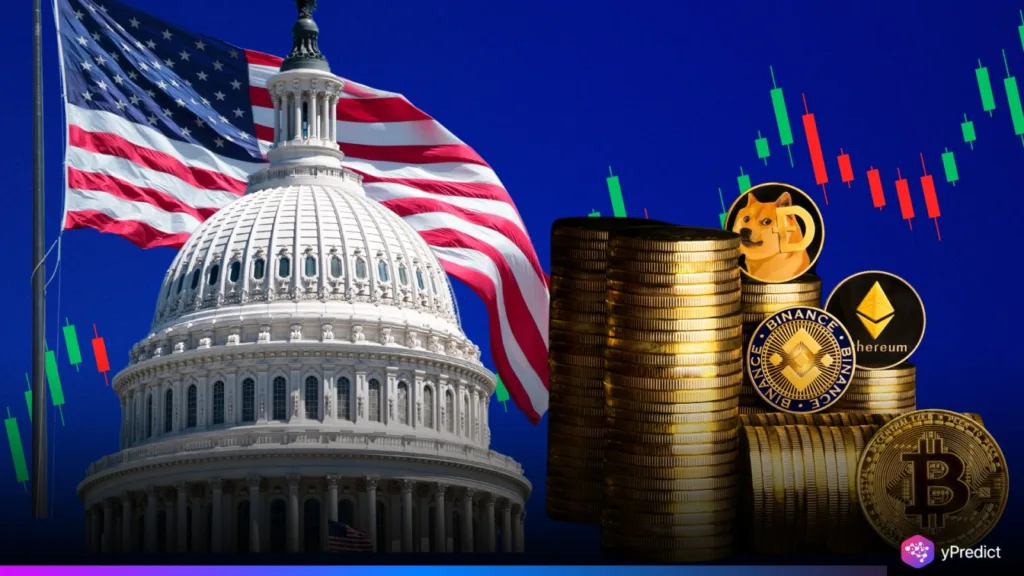
The U.S. House of Representatives will observe Crypto Week from July 14 to July 18, 2025, marking a high-stakes political showdown over the future of digital assets and artificial intelligence. The announcement came from Bo Hines, U.S. Director of Digital Assets, through a widely circulated X post that stirred immediate reactions across both political and tech landscapes.
Hines’ announcement confirmed the House will table two critical bills—the GENIUS Act and the CLARITY Act, aimed at streamlining AI-powered blockchain infrastructure and digital asset frameworks. The move is expected to ignite fierce debate, especially as the crypto market anticipates a potential valuation surge of $15–20 trillion, as forecast by Hines in a recent crypto news interview. The legislation carries not just market weight but a clear political undercurrent, reinforced by visible executive support.
Bo Hines Leads Pro-Crypto AI Policy Drive
Bo Hines has emerged as a central figure in shaping America’s AI-integrated crypto future. His push for Crypto Week is timed with growing demands for federal clarity in how AI interacts with digital finance. At the center of this effort lies the GENIUS Act—a bill that proposes structured guidelines for AI deployment in crypto protocols, particularly in fraud detection, risk modeling, and decentralized governance.
Hines told crypto. news earlier this month that the Act provides the roadmap for integrating responsible AI into every layer of our digital asset ecosystem. The CLARITY Act, proposed alongside it, targets disclosure norms and transparency for AI-powered crypto startups. Together, these bills aim to balance innovation with regulation, a theme Hines has consistently championed since his appointment.
Trump’s “Big Beautiful Bill” Signals Executive Alignment
The legislative momentum didn’t appear overnight. The image attached to Hines’ post shows a recent signing event with former President Donald Trump, who endorsed the direction by signing the Big Beautiful Bill on July 5, 2025. That executive action, though focused on broader campaign promises, included key language around centralizing AI-driven crypto infrastructure under federal oversight.
This alignment between the executive office and legislative advocates like Hines has helped the GENIUS and CLARITY Acts gain early traction. Trump’s visible support has also helped shift conservative sentiment toward embracing regulated AI-crypto ecosystems, marking a stark pivot from the previous decentralized-first rhetoric. The White House has yet to issue a formal statement, but political observers view Trump’s involvement as a signal that Crypto Week could result in fast-tracked legislation before the August recess.
Democrats Counter with “Anti-Crypto Corruption Week”
Not everyone supports the new direction—House Democrats, led by Reps. Maxine Waters and Stephen Lynch launched Anti-Crypto Corruption Week to counter Hines’ narrative. Their campaign warns of what they label “AI-fueled corruption risks” embedded in unchecked crypto growth. They cite a 2023 National Bureau of Economic Research study warning that improperly regulated AI and digital asset markets could raise systemic financial instability by up to 20%.
Waters and Lynch argue that the GENIUS Act lacks sufficient oversight mechanisms and that the legislation would empower centralized actors at the cost of transparency. Their alternative agenda proposes a moratorium on all AI-led crypto pilot programs until independent ethics boards and regulatory agencies approve risk frameworks. Hines, however, dismissed the criticism as “fear-based politics” disconnected from market and tech realities.
Crypto Week Sets Stage for AI-Crypto Market Expansion
With Crypto Week fast approaching, excitement is growing throughout markets, startups, and Capitol Hill. Leaders from the industry are anticipating whether the GENIUS Act will yield a regulatory framework that will create an AI-first regulatory environment that does not stifle innovation. For many blockchain developers and investors, July 14 may mark a new chapter if the timelines for federal clarity help with adoption, investment, and technology development. Critics are ensuring that legislative speed does not outpace ethics, especially with AI moving into the realm of financial transactions in complex deals.
With Bo Hines at the helm and support from the executive branch, the coming week is set to define whether the U.S. can lead the global race in AI-integrated digital assets or fall into deeper political divides over how crypto and artificial intelligence should be governed.






